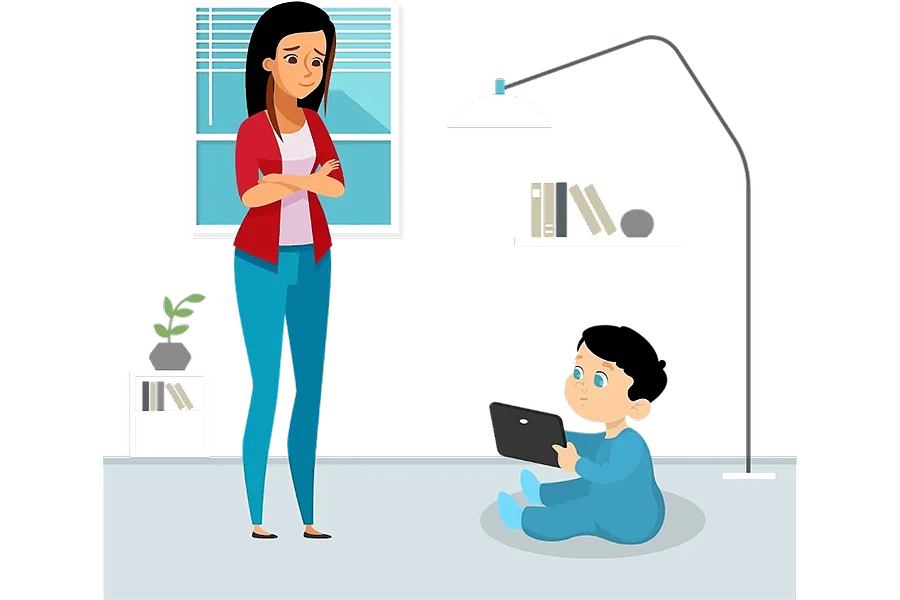
Multiple studies are done around screen time but overall none gave any major positive benefits of screentime impact for the baby. Post COVID reports suggest screentime of kids risen to 3 hours per day on an average. Also, due to work from home kids less than 2 years are getting exposed to it. This dangerous trend have exponentially increased the worse impact of screentime on baby.
Age-wise Screentime impact on baby –
-
- Age less than 2 years – Language issues, vocal problems, Slow body movements, and lack of cognitive development are major issues which studies show if a toddler of lesser than 2 years age is exposed to TV/Mobile.
-
- Age group 2-5 years – Overweight, Lack of activity, Slow education, Eye problems, etc. are major issues that are observed among kids of 2-5 years with excess screen time.
Commercial TV often introduces children to advertising for unhealthy foods while strengthening sedentary habits, and facilitates snacking, which raises total food consumption.
Most studies have identified negative results with as little as 1 hour/day of exposure in a 2012 systematic analysis of TV watching and adverse dietary results in kids 2 to 5 years old. The amount of time spent watching screens before bedtime is correlated with an increase in sleep issues for this age group, and evidence indicates that screen time volume is detrimental to sleep habits rather than content alone.
Due in part to melatonin reduction, the presence of any electronic device in a bedroom is correlated with fewer minutes of sleep each night.
Reference from Babies need humans, not screens
How to avoid screen time of babies and kids?
- Elders should avoid the use of mobile phones excessively at home unless it’s important.
- TV should be off and it should not be present in the room of a baby /kid.
- Engage the baby and kid in the right toys, music, outdoor activities, books, etc.
- Use a separate room during work from home.
Recent studies confirm a clear link between the screen time of parents and that of their children, raising concerns that increasing media presence displaces quality (face-to-face) interactions between parent and child and family. A new analysis of smartphone usage in fast-food restaurants showed that as parents spend time on their phones, the risk of children acting out to gain attention has also increased, sometimes contributing to negative experiences. Another study found that parents who encourage 1- to 4-year-old kids to use their smartphones frequently often report offering the phone more often to reward or distract them. As a result, their kids ask for the phone and get angry if denied more frequently.
Reference from Media Use by Children Younger Than 2 Years
What content to watch for kids 2-5 years?
- Educational based content developed for the kid or cartoons specially derived for development of the baby’s 2-5 years.
- Parents should be present with the kid while they watch the TV/Mobile.
- A parent should take the kids for an outing if they are persisting for longer screen time.
What are the benefits of screentime?
Controlled screen time of around 1 hour per day for kids in an age group of 3-5 years, a well-designed content helps in learning anti violence attitudes, empathy, tolerance, and respect, also it helps in social and language skills.
Screen time will relax a child who is over-excited or anxious (e.g. during a medical procedure) if used appropriately. But screen learning can have a positive as well as a negative effect on actions, so it is important to ensure quality content.
Developing a ‘media action plan’ for the family will help to protect and improve the quality of family time. Ideally, planning starts prenatally; provides for a child and family member’s wellness, education, and entertainment needs; requires screen-based child care activities; and is regularly reviewed. It is much easier to set meaningful limits when kids are young and share them as a family than to reduce screen time when kids are older.
So, what is recommended screen time –
- 0-2 years babies: Ideally it should be completely 0.
- 2-5 Years: Controlled content for 1 hour/day, not more than that.
- Avoid screens for at least 1 hour before bedtime, given the potential for melatonin-suppressing effects.
Join Uptodd Positive Parenting program for your baby’s growth and development.
